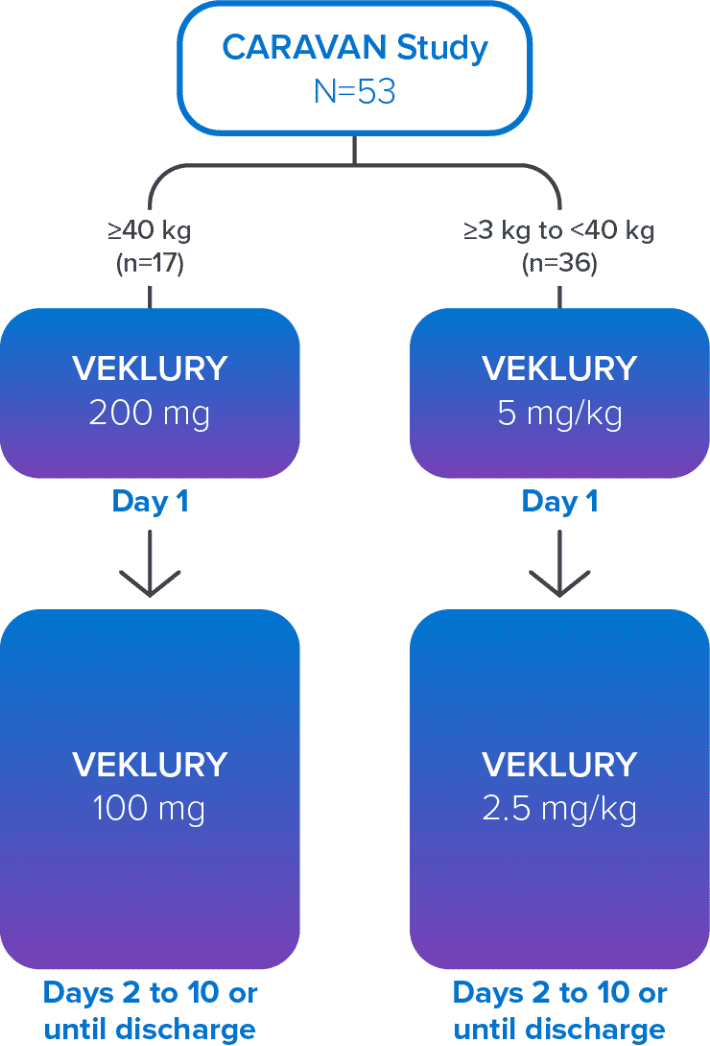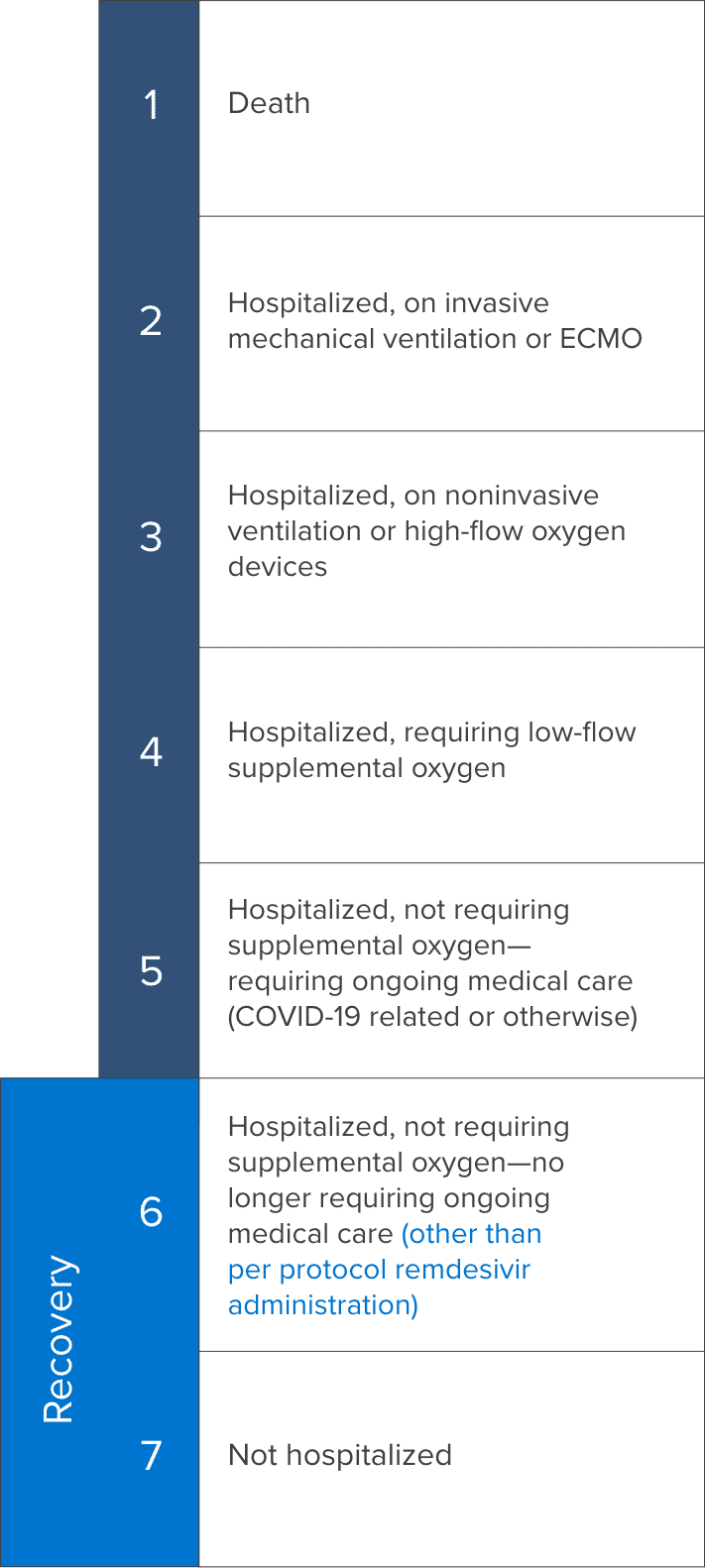VEKLURY helped improve clinical status in patients hospitalized with COVID-19 as young as 28 days old who weighed ≥3 kg1
Recovery was reported for a majority of pediatric patients treated with VEKLURY1
recovered by Day 10
- Median time to recovery was 7 days
- 60% of patients were discharged by Day 10
- 83% of patients were discharged by Day 30
Recovery was defined as an improvement from a baseline clinical status score of 2 through 5 to a score of 6 or 7, or an improvement from a baseline score of 6 to a score of 7.
The CARAVAN study (GS-US-540-5823) was a single-arm, open-label, phase 2/3 clinical trial to evaluate safety, tolerability, and pharmacokinetics of up to 10 days of treatment with VEKLURY in pediatric patients with mild, moderate, or severe COVID-19. Pediatric patients had confirmed positive results for SARS-CoV-2 infection, were ≥28 days old, and weighed ≥3 kg.1
Study design1,2
At baseline, the median age was 7 years and patients had a range of COVID-19 severity:
- 13 patients (25%) were on room air
- 10 patients (19%) were on low-flow oxygen
- 18 patients (34%) were on noninvasive ventilation or high-flow oxygen
- 12 patients (23%) were on invasive mechanical ventilation
Safety parameters in the CARAVAN study1
The safety of VEKLURY was evaluated in pediatric patients
- The adverse reactions observed with VEKLURY in the CARAVAN study were consistent with those demonstrated in adult studies
- Adverse reactions (all grades) were reported in 8 (15%) patients
- The most common adverse reaction (≥5%) in patients taking VEKLURY was an increase in ALT levels
- No patients experienced serious adverse reactions
- 3 deaths occurred; all had complex medical histories, including multisystem organ failure and cardiorespiratory arrest among others2
Laboratory abnormalities (Grades 3–4) reported in ≥3% of pediatric patients
| Laboratory parameter abnormality | VEKLURY(N=53) |
|---|---|
| ALT increased | 4% |
| APTT increased | 7% |
| Creatinine increased | 10% |
| Direct bilirubin increased | 9% |
| eGFR decreased | 18% |
| Glucose increased | 4% |
| Glycosuria | 4% |
| Hemoglobin decreased | 18% |
| Lymphocytes decreased | 6% |
| Potassium decreased | 4% |
| Proteinuria | 6% |
| Prothrombin time increased | 7% |
| WBC count decreased | 4% |
APTT=activated partial thromboplastin time; WBC=white blood cell.
Baseline characteristics1
| Characteristic | VEKLURY(N=53) |
|---|---|
| Median age (IQR), y | 7 (2-12) |
| Median weight (range), kg | 25 (4-192) |
| Female sex, % | 57 |
| Race or ethnic group, % | |
| White | 70 |
| Black | 30 |
| Hispanic or Latinx | 44 |
| Respiratory support at baseline, n (%) | |
| Invasive mechanical ventilation | 12 (23) |
| Noninvasive ventilation or high-flow oxygen | 18 (34) |
| Low-flow oxygen | 10 (19) |
| Room air | 13 (25) |
| Overall median duration of symptoms (IQR), days | 5 (3-7) |
| Hospitalization prior to first dose of VEKLURY (IQR), days | 1 (1-3) |
IQR=interquartile range.
7-point ordinal scale1,3
Patient clinical status was assessed on a 7-point ordinal scale with a lower score indicating greater clinical severity.
ECMO=extracorporeal membrane oxygenation.
See VEKLURY data on disease progression and recovery time
ACTT-1 STUDYSee clinical outcomes for VEKLURY in high-risk patients
OUTPATIENT STUDYImportant Safety Information
Collapse
Contraindication
- VEKLURY is contraindicated in patients with a history of clinically significant hypersensitivity reactions to VEKLURY or any of its components.
Warnings and precautions
- Hypersensitivity, including infusion-related and anaphylactic reactions: Hypersensitivity, including infusion-related and anaphylactic reactions, has been observed during and following administration of VEKLURY; most reactions occurred within 1 hour. Monitor patients during infusion and observe for at least 1 hour after infusion is complete for signs and symptoms of hypersensitivity as clinically appropriate. Symptoms may include hypotension, hypertension, tachycardia, bradycardia, hypoxia, fever, dyspnea, wheezing, angioedema, rash, nausea, diaphoresis, and shivering. Slower infusion rates (maximum infusion time of up to 120 minutes) can potentially prevent these reactions. If a severe infusion-related hypersensitivity reaction occurs, immediately discontinue VEKLURY and initiate appropriate treatment (see Contraindications).
- Increased risk of transaminase elevations: Transaminase elevations have been observed in healthy volunteers and in patients with COVID-19 who received VEKLURY; these elevations have also been reported as a clinical feature of COVID-19. Perform hepatic laboratory testing in all patients (see Dosage and administration). Consider discontinuing VEKLURY if ALT levels increase to >10x ULN. Discontinue VEKLURY if ALT elevation is accompanied by signs or symptoms of liver inflammation.
- Risk of reduced antiviral activity when coadministered with chloroquine or hydroxychloroquine: Coadministration of VEKLURY with chloroquine phosphate or hydroxychloroquine sulfate is not recommended based on data from cell culture experiments, demonstrating potential antagonism, which may lead to a decrease in the antiviral activity of VEKLURY.
Adverse reactions
- The most common adverse reaction (≥5% all grades) was nausea.
- The most common lab abnormalities (≥5% all grades) were increases in ALT and AST.
Dosage and administration
- Administration should take place under conditions where management of severe hypersensitivity reactions, such as anaphylaxis, is possible.
- Treatment duration:
- For patients who are hospitalized, VEKLURY should be initiated as soon as possible after diagnosis of symptomatic COVID-19.
- For patients who are hospitalized and do not require invasive mechanical ventilation and/or ECMO, the recommended treatment duration is 5 days. If a patient does not demonstrate clinical improvement, treatment may be extended up to 5 additional days, for a total treatment duration of up to 10 days.
- For patients who are hospitalized and require invasive mechanical ventilation and/or ECMO, the recommended total treatment duration is 10 days.
- For patients who are not hospitalized, diagnosed with mild-to-moderate COVID-19, and are at high risk for progression to severe COVID-19, including hospitalization or death, the recommended total treatment duration is 3 days. VEKLURY should be initiated as soon as possible after diagnosis of symptomatic COVID-19 and within 7 days of symptom onset for outpatient use.
- Testing prior to and during treatment: Perform hepatic laboratory and prothrombin time testing prior to initiating VEKLURY and during use as clinically appropriate.
- Renal impairment: No dosage adjustment of VEKLURY is recommended in patients with any degree of renal impairment, including patients on dialysis. VEKLURY may be administered without regard to the timing of dialysis.
Pregnancy and lactation
- Pregnancy: A pregnancy registry has been established for VEKLURY. Available clinical trial data for VEKLURY in pregnant women have not identified a drug-associated risk of major birth defects, miscarriage, or adverse maternal or fetal outcomes following second- and third-trimester exposure. There are insufficient data to evaluate the risk of VEKLURY exposure during the first trimester. Maternal and fetal risks are associated with untreated COVID-19 in pregnancy.
- Lactation: VEKLURY can pass into breast milk. The developmental and health benefits of breastfeeding should be considered along with the mother’s clinical need for VEKLURY and any potential adverse effects on the breastfed child from VEKLURY or from an underlying maternal condition. Breastfeeding individuals with COVID-19 should follow practices according to clinical guidelines to avoid exposing the infant to COVID-19.
INDICATION
View All
Collapse
VEKLURY is indicated for the treatment of COVID-19 in adults and pediatric patients (birth to <18 years of age weighing ≥1.5 kg), who are:
VEKLURY is indicated for the treatment of COVID-19 in adults and pediatric patients (birth to <18 years of age weighing ≥1.5 kg), who are:
Please see full Prescribing Information for VEKLURY.
View All
INDICATION
View All
Collapse
VEKLURY is indicated for the treatment of COVID-19 in adults and pediatric patients (birth to <18 years of age weighing ≥1.5 kg), who are:
VEKLURY is indicated for the treatment of COVID-19 in adults and pediatric patients (birth to <18 years of age weighing ≥1.5 kg), who are:
Please see full Prescribing Information for VEKLURY.
Important Safety Information
Collapse
Contraindication
- VEKLURY is contraindicated in patients with a history of clinically significant hypersensitivity reactions to VEKLURY or any of its components.
Warnings and precautions
- Hypersensitivity, including infusion-related and anaphylactic reactions: Hypersensitivity, including infusion-related and anaphylactic reactions, has been observed during and following administration of VEKLURY; most reactions occurred within 1 hour. Monitor patients during infusion and observe for at least 1 hour after infusion is complete for signs and symptoms of hypersensitivity as clinically appropriate. Symptoms may include hypotension, hypertension, tachycardia, bradycardia, hypoxia, fever, dyspnea, wheezing, angioedema, rash, nausea, diaphoresis, and shivering. Slower infusion rates (maximum infusion time of up to 120 minutes) can potentially prevent these reactions. If a severe infusion-related hypersensitivity reaction occurs, immediately discontinue VEKLURY and initiate appropriate treatment (see Contraindications).
- Increased risk of transaminase elevations: Transaminase elevations have been observed in healthy volunteers and in patients with COVID-19 who received VEKLURY; these elevations have also been reported as a clinical feature of COVID-19. Perform hepatic laboratory testing in all patients (see Dosage and administration). Consider discontinuing VEKLURY if ALT levels increase to >10x ULN. Discontinue VEKLURY if ALT elevation is accompanied by signs or symptoms of liver inflammation.
- Risk of reduced antiviral activity when coadministered with chloroquine or hydroxychloroquine: Coadministration of VEKLURY with chloroquine phosphate or hydroxychloroquine sulfate is not recommended based on data from cell culture experiments, demonstrating potential antagonism, which may lead to a decrease in the antiviral activity of VEKLURY.
Adverse reactions
- The most common adverse reaction (≥5% all grades) was nausea.
- The most common lab abnormalities (≥5% all grades) were increases in ALT and AST.
Dosage and administration
- Administration should take place under conditions where management of severe hypersensitivity reactions, such as anaphylaxis, is possible.
- Treatment duration:
- For patients who are hospitalized, VEKLURY should be initiated as soon as possible after diagnosis of symptomatic COVID-19.
- For patients who are hospitalized and do not require invasive mechanical ventilation and/or ECMO, the recommended treatment duration is 5 days. If a patient does not demonstrate clinical improvement, treatment may be extended up to 5 additional days, for a total treatment duration of up to 10 days.
- For patients who are hospitalized and require invasive mechanical ventilation and/or ECMO, the recommended total treatment duration is 10 days.
- For patients who are not hospitalized, diagnosed with mild-to-moderate COVID-19, and are at high risk for progression to severe COVID-19, including hospitalization or death, the recommended total treatment duration is 3 days. VEKLURY should be initiated as soon as possible after diagnosis of symptomatic COVID-19 and within 7 days of symptom onset for outpatient use.
- Testing prior to and during treatment: Perform hepatic laboratory and prothrombin time testing prior to initiating VEKLURY and during use as clinically appropriate.
- Renal impairment: No dosage adjustment of VEKLURY is recommended in patients with any degree of renal impairment, including patients on dialysis. VEKLURY may be administered without regard to the timing of dialysis.
Pregnancy and lactation
- Pregnancy: A pregnancy registry has been established for VEKLURY. Available clinical trial data for VEKLURY in pregnant women have not identified a drug-associated risk of major birth defects, miscarriage, or adverse maternal or fetal outcomes following second- and third-trimester exposure. There are insufficient data to evaluate the risk of VEKLURY exposure during the first trimester. Maternal and fetal risks are associated with untreated COVID-19 in pregnancy.
- Lactation: VEKLURY can pass into breast milk. The developmental and health benefits of breastfeeding should be considered along with the mother’s clinical need for VEKLURY and any potential adverse effects on the breastfed child from VEKLURY or from an underlying maternal condition. Breastfeeding individuals with COVID-19 should follow practices according to clinical guidelines to avoid exposing the infant to COVID-19.

-Logo-KO-Blue-Image.svg)




